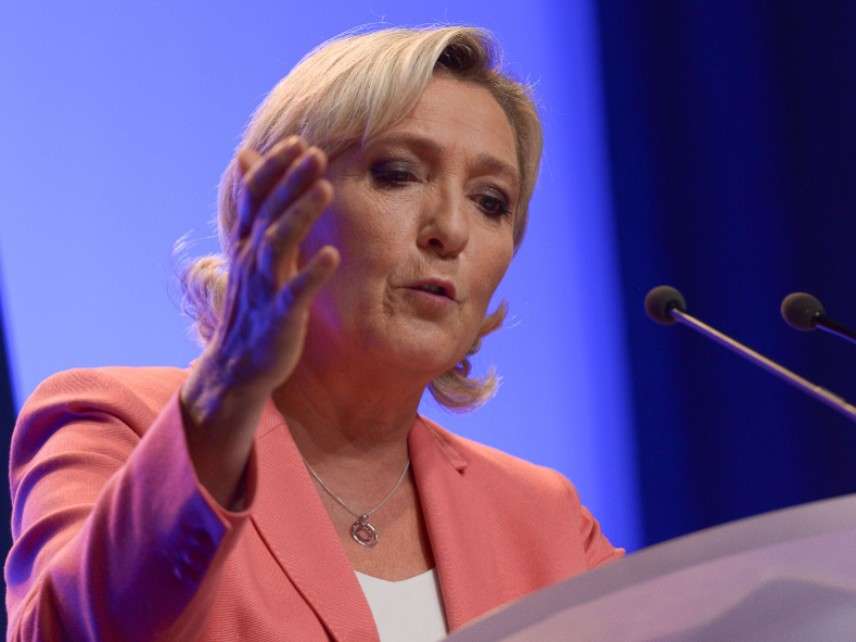The Marine Le Pen Case Shows That Supposedly Enlightened France Treats Political Speech As a Crime and a Symptom of Mental Illness
The right-wing politician faces prosecution and psychiatric examination for posting pictures of ISIS atrocities.

France ranked 12 notches above the United States in this year's World Press Freedom Index, produced by Reporters Without Borders. But such ratings can be misleading, as illustrated by the prosecution of Marine Le Pen, head of the right-wing National Rally party (formerly the National Front), for posting images of ISIS atrocities on Twitter. Last week Le Pen revealed that she had been ordered to undergo a psychiatric examination as part of the investigation into her speech crime, which added another layer of Soviet-style thought control to the story.
It is inconceivable that an American politician, no matter how extreme his views, would be prosecuted for doing what Le Pen did, because a law like the one she is charged with violating would be clearly inconsistent with the First Amendment. That law, Article 227-24 of the French Criminal Code, makes it a crime, punishable by a fine of €75,000 (about $88,000) and up to three years in prison, to distribute "a message bearing a pornographic or violent character or a character seriously violating human dignity…where the message may be seen or perceived by a minor." Le Pen allegedly ran afoul of that prohibition in 2015 by posting three pictures of men murdered by ISIS—one beheaded, one burned alive, and one run over by a tank—in response to a Twitter user who likened her party to the terrorist organization. "Daesh [the Arabic acronym for ISIS] is this!" she tweeted.
This case vividly illustrates why Article 227-24 would never pass constitutional muster in the United States. Le Pen's tweet is indisputably political speech, sitting at the core of the expression protected by the First Amendment. The terms of Article 227-24 (especially the phrase "seriously violating human dignity") are broad and vague, encouraging self-censorship and inviting politically motivated prosecution of people who irk the powers that be. Le Pen, who unsuccessfully ran against Emmanuel Macron in a presidential runoff last year, was stripped of her parliamentary immunity six months later, leaving her open to prosecution.
That decision also left Le Pen open to a court-ordered psychiatric assessment, which she says she will resist. The BBC describes the order as "standard procedure," citing Le Parisen, which reports that prosecutors said "Article 706-47-1 of the Code of Criminal Procedure" provides the statutory authority for requiring an examination of Le Pen. Yet that provision applies only to people accused of "procuring concerning a minor," "forcing a minor into prostitution," and violent crimes such as sexual assault, "torture or acts of barbarity," and murder of a child "accompanied by acts of rape." It's telling that Le Parisien saw nothing amiss about putting Le Pen's "crime"—expressing her political views on Twitter—in the same category as rape, torture, and murder.
The notice that Le Pen received from Carole Bochter, the investigating judge handling the case, actually cites Article 161-1 of the Code of Criminal Procedure, a more general provision that authorizes judges to seek guidance from "experts" when they deem it "useful." Ordering a psychiatric examination was a matter of discretion, in other words, notwithstanding the claim by Le Parisen, the BBC, and other media outlets that it was standard procedure or even required by law. That legal leeway lends plausibility to Le Pen's complaint that the French government is taking a page from the Soviet playbook by treating political dissent as a mental illness.
The BBC says Bochter "wants the tests to determine if [Le Pen] suffers mental illness or is 'capable of understanding remarks and answering questions.'" Le Parisien says "the expert in charge of this psychiatric examination is supposed to check whether Marine Le Pen was or was not 'suffering from a psychic or neuropsychic disorder that impaired her discernment' when she posted the photos." The implication does seem to be, as Le Pen's allies claim, that Bochter sees her political speech as a evidence of a mental disorder.
Article 227-24 is not the only way in which French law deviates from the Enlightenment values to which French officials pay lip service. In addition to Twitter posts about terrorism, French legislators have criminalized Holocaust denial, public display of Nazi symbols, and insults or incitement of hatred based on race, religion, ethnicity, national origin, sex, sexual orientation, or disability. All of these bans would be non-starters under U.S. constitutional law. Shouldn't actual legal restrictions on speech carry more weight in a ranking of press freedom than Donald Trump's dreams of silencing people who offend him?

Show Comments (89)